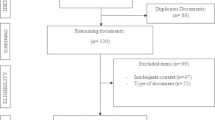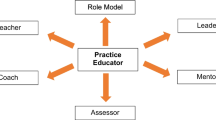Abstract
Previous debate has explored whether medical education research should become more like health services research in terms of frameworks, collaborations and methodologies. Notable recent changes in health services research include an increasing emphasis on complex interventions, defined as interventions that involve more than one component. The purpose of this study was to explore the extent of thinking about medical education as a complex intervention and to analyse medical education research to determine whether its collaborations and methodologies are becoming more like health services research. Research articles published in three journals over 2 years were analysed to determine the purpose of the research in relation to a framework for evaluating complex interventions, the degree of collaboration, and the methodology. Most studies aimed to develop theory or assess effectiveness and many categories of the complex interventions framework were not represented in the medical education research literature. Studies usually involved only one research site and were predominantly quantitative but not experimental or quasi-experimental. Whilst medical education research has not moved significantly in the direction of health services research over recent years, the complex interventions lens provided insights into why this might be so (namely the significant challenges associated with researching medical education). We recommend that medical education researchers work within a complex interventions framework and look to research fields with similar challenges (e.g. the study of chronic illness in a changing context) for ideas about theories, frameworks, methodologies and collaborations that can illuminate the field of medical education research.

Similar content being viewed by others
References
AcademyHealth. (2000). Health Services Research. Retrieved September 10, 2011, from www.academyhealth.org.
Baernstein, A., Liss, H. K., Carney, P. A., & Elmore, J. G. (2007). Trends in study methods used in undergraduate medical education research, 1969–2007. Journal of the American Medical Association, 298, 1038–1045.
Campbell, M., Fitzpatrick, R., Haines, A., Kinmonth, A. L., Sandercock, P., Spiegelhalter, D., et al. (2000). Framework for design and evaluation of complex interventions to improve health. British Medical Journal, 321, 694–696.
Campbell, N. C., Murray, E., Darbyshire, J., Emery, J., Farmer, A., Griffiths, F., et al. (2007). Designing and evaluating complex interventions to improve health care. British Medical Journal, 334, 455–459.
Carline, J. D. (2004). Funding medical education research: Opportunities and issues. Academic Medicine, 79, 918–924.
Clauser, S. B., Taplin, S. H., Foster, M. K., Fagan, P., & Kaluzny, A. D. (2012). Multilevel intervention research. Journal of the National Cancer Institute Monographs, 44, 127–133.
Coast, J., Flynn, T., Sutton, E., AL-Janabi, H., Vosper, J., Lavender, S., et al. (2008). Investigating choice experiments for preferences of Older People. Health Services Research and Policy, 13, 31–37.
Cooksey, D. (2006). A review of UK health research funding. Retrieved September 8, 2011, from http://www.official-documents.gov.uk/document/other/0118404881/0118404881.pdf.
Dieppe, P., & Ades, T. (2008). Why does health services research seem so hard to fund? Health Services Research and Policy, 13, 1–5.
El-Sawi, N. I., Sharp, G. F., & Gruppen, L. D. (2009). A small grants program improves medical education research productivity. Academic Medicine, 84, S105–S108.
Martin, C. M., & Felix-Borlolotti, M. (2010). W(h)ither complexity? Journal of Evaluation in Clinical Practice, 16, 415–420.
May, C. R., Finch, T., Ballini, L., MacFarlane, A., Mair, F., Murray, E., et al. (2011). Evaluating complex interventions and health technologies using normalisation process theory. BMC Health Services Research, 11, 245.
McKinley, R. K. (2007). Something needs to be done. British Medical Journal. Letter in response to Todres et al. 2007. Retrieved October 14, 2011, from http://www.bmj.com/content/335/7615/333/reply.
Medical Research Council (2008) Developing and evaluating complex interventions: new guidance. Retrieved September 8, 2011, from http://www.mrc.ac.uk/Utilities/Documentrecord/index.htm?d=MRC004871.
Michie, S. (2008). Designing and implementing behaviour change interventions to improve population health. Health Services Research and Policy, 13, 64–69.
Norman, G. (2010). Is experimental research passé? Advances in Health Sciences Education, 15, 297–301.
Reed, D. A., Cook, D. A., Beckman, T. J., Levine, R. B., Kern, D. E., & Wright, S. M. (2007). Association between funding and quality of published medical education research. Journal of the American Medical Association, 298, 1002–1009.
Sandars, J. E. (2007). Only half the story! British Medical Journal. Letter in response to Todres et al. 2007. Retrieved October 14, 2011, from http://www.bmj.com/content/335/7615/333/reply.
Schuwirth, L. W., & van der Vleuten, C. P. (2006). Challenges for educationalists. British Medical Journal, 333, 544–546.
Searle, J., & Prideaux, D. (2005). Medical education research: Being strategic. Medical Education, 39, 544–546.
Shea, J. (2001). Mind the gap: Some reasons why medical education research is different from health services research. Medical Education, 35, 319–320.
Shea, J. A., Arnold, L., & Mann, K. V. (2004). A RIME perspective on the quality and relevance of current and future medical education research. Academic Medicine, 79, 931–938.
Todres, M., Stephenson, A., & Jones, R. (2007). Medical education research remains the poor relation. British Medical Journal, 335, 333–335.
Watt, G. C. M. (2005). Where health services research has led, medical education research may follow. Medical Education, 39, 555–556.
Acknowledgments
The authors are grateful to Bradley Yee and Martin Roberts for their help with the data analysis.
Conflict of interest
None.
Author information
Authors and Affiliations
Corresponding author
Rights and permissions
About this article
Cite this article
Mattick, K., Barnes, R. & Dieppe, P. Medical education: a particularly complex intervention to research. Adv in Health Sci Educ 18, 769–778 (2013). https://doi.org/10.1007/s10459-012-9415-7
Received:
Accepted:
Published:
Issue Date:
DOI: https://doi.org/10.1007/s10459-012-9415-7




